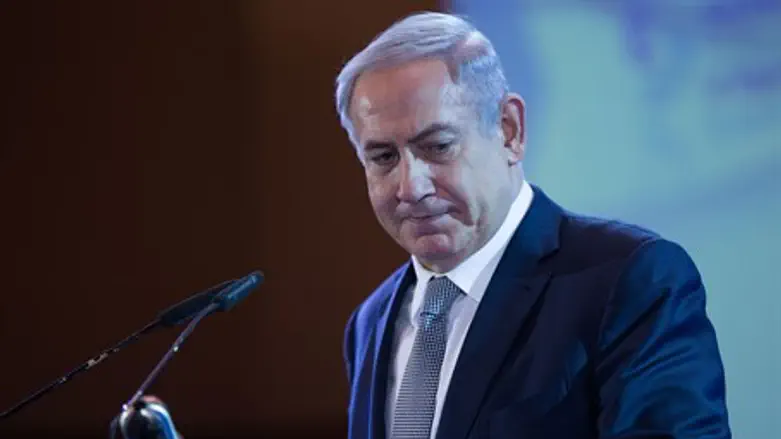
Prime Minister Binyamin Netanyahu on Sunday evening addressed the Conference of Presidents of Major American Jewish Organizations in Jerusalem.
In the speech, Netanyahu blasted the UN’s bias against Israel while also praising Israel’s relations with other countries - and especially Arab countries which are beginning to understand that Israel isn’t their enemy.
“We live in an era where there are two parallel but contradictory trends regarding the State of Israel. The first one is all too familiar to you and that's the ongoing multinational hostility to Israel. You see it at the UN; you see it at the UN Human Rights Council – I can't believe there is such a term that is so self-contradictory: UN Human Rights Council; the ICC; regrettably the EU,” he said.
“We've had some efforts to change at least the EU. But we know that in many of these multinational forums, Israel is singled out. I hope that one day we'll receive a double standard because right now, we're not enjoying a double standard; we are suffering a triple standard. There is one standard for the democracies – well, there's one standard for the dictatorships. They're usually exempt. The other is for the democracies and there's still a third standard for the democracy called Israel. I think you're all familiar with that and in some senses it's getting worse,” continued Netanyahu.
But at the same time, he added, “there is an opposing trend...countries like India, China, Japan, Russia – they're all coming to Israel. Scarcely a week goes by that we don't have a delegation from one of these countries of either political office-holders, or more and more, entrepreneurs, heads of companies. The same is happening in the nations of Africa and Latin America – virtually all of them. And they're all coming here. And the reason they're coming here is for two reasons.”
“The first reason is the concern with the spread of militant Islam, which has become a global plague and there terrorism that it produces,” Netanyahu said. “And countries want to have, to benefit from Israel's experience, our intelligence. I mean, military intelligence, special service intelligence, operational experience. They want to partake of that experience to help defend themselves. So one reason they're coming here with increasing numbers is the battle against the forces of yesterday, the forces of medievalism that want to take back our world at least a thousand years.”
“The second reason they're coming here is because they want to embrace the future, and they see Israel as a thriving, dynamic economy that has fostered innovation, that has great capabilities, and basically when they come for this reason, they come for three reasons: technology, technology and technology. That's why they're coming here,” he added.
“So because of these two forces, you have this tremendous change where countries in all the continents of the world are coming to Jerusalem, coming to Tel Aviv, coming to Be’er Sheva, which has become a center of cyber security for the world – a global center of cyber security. They're coming here because they want cyber security. They want to improve their management of their water resources. They want desalinization. They want recycling. They want agriculture. They want biotech. They want technology – Israeli technology, Israeli technology, Israeli technology.”
Netanyahu also noted a “dramatic shift” whereby Arab countries are changing their view of Israel.
“That is, that they don't see Israel anymore as their enemy, but they see Israel as their ally, especially in the battle against militant Islam with its two fountainheads: the militant Islamists led by Iran and the militant Islamists led by Daesh (ISIS -ed.). And to this or that extent, all or most of the Arab countries, if not all of them in the Middle East, with the exception of Syria perhaps – strike perhaps, with the exception of Syria, but that's no longer a country – they all feel threatened by this dual threat, more as you go to the Persian Gulf by Iran, and more as you go westward towards Africa from Daesh. But they all see the combination of these two threats and they see Israel as their ally, not as their enemy, in confronting these threats. Now, this is something that is forging new ties, many of them discreet, some of them open. And I think there too we can expect and should expect and should ask to see a change,” he said.
“It used to be said that if we have, if we can have some kind of progress, political progress with the Palestinians, that would bring about better relations with the Arab world. I think it could actually be the other way around. I think the better relations with the Arab world could help bring progress with the Palestinians,” said Netanyahu. I think that is very clear given the, what I regret to say is the dysfunctionality that I often see in Palestinian politics, and I think that the encouragement of Arab states, leading Arab states, for a more realistic position on the part of the Palestinian Authority might contribute to a stabilizing situation and even advancing to a better future.”
At the same time, Netanyahu stressed, “I want to say emphatically that we have no illusions that America remains the best friend of the State of Israel.”
“The United States and Israel are the greatest allies. And I deeply appreciate the support of President Obama, the Congress, the American people,” he continued. “We're working together today on an MoU. I hope that we can complete it soon, and we certainly will welcome Vice President Biden, who will come to visit us. I think it's another reflection of this deep friendship between our countries. And I think the American people understand that in this turbulent Middle East and this turbulent world, America has no better friend than Israel and Israel has no better friend than the United States of America,” he told the gathering.